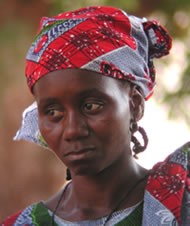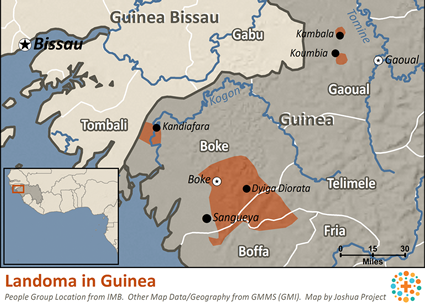Landumas live mostly in small villages of 50 to 400 people, scattered across the hilly wooded savanna of northwest Guinea, primarily in the prefecture of Boké. Oral tradition traces the Landumas' ancestry to the village of Kokoli, several miles to the northeast. Linguistically the Landumas are most closely related to the Baga groups of Guinea, as well as to the Temne of Sierra Leone.
Almost all Landumas are subsistence farmers, using simple hand tools and slash and burn agricultural practices to cultivate the thin and increasingly depleted soil on the hills around their villages. They plant rice, millet, corn, and other grain crops for food, and peanuts primarily as a cash crop. They also plant gardens of manioc, sweet potatoes, bananas, peppers, tomatoes and other vegetables, and orchards of mangos, oranges, cashews and other fruits. Palm nuts are gathered for the oil. Several varieties of wild fruits are gathered to supplement their diet.
The Landumas live much of their lives from hand to mouth with little or no reserve of money or goods. The harvest of rice and/or millet is always gone several months before the next harvest comes in, resulting in much hunger. Often, they find it necessary to go into debt in order to buy food, to buy seed to plant, to build a house, to get married, or to handle other large expenses. When a crop comes in, the debts must be paid, leaving little left over to eat or sell. And so the cycle continues.
The primary meal is cooked grain with palm oil sauce. Hunting and fishing, as well as purchased dried fish, helps provide some protein for the sauce. They raise chickens, sheep, and goats but generally meat is only eaten on special occasions such as when entertaining guests or celebrating a wedding or religious festival.
Most Landumas live in sun-dried mud brick houses with grass or tin roofs. They have few possessions. When hard times come, in addition to going into debt, they usually sell anything of value in order to obtain cash to buy food.
The Landuma people are very socially interdependent. Because of their poverty they must depend on each other for physical support. A person who has the means to help another in need must do so; if he doesn't, he will not receive help when he needs it. They are socially interdependent as well. For example, a man must depend on many relatives to help him obtain a wife, and plan and carry out the wedding ceremony.
This social interdependence and community solidarity makes it very difficult for a Landuma person to make important decisions on his own. He must carefully consider how those he depends on will react to the decision he is making, lest he offend someone and lose an important resource. Thus the decision to listen to Bible teaching or become a Christian is very difficult to make. Several Landumas have heard the message of salvation in their own language, and some say they believe it. But most are unwilling to separate from their old religion lest they antagonize their neighbors and family members, and thus risk losing the important physical and social support they depend upon.
Most Landumas profess Islam; a few are Catholics. Regardless of outward religion, nearly all continue to hold to animistic beliefs, and practice rituals such as sacrifices for the dead, utilization of protective charms, and sorcery for various purposes such as healing or causing injury and death.
Each village has a mosque or prayer place. The people from several villages gather each Friday for prayer at a central mosque village. Many villages have a Muslim Koranic teacher who runs an Arabic school. At night the students sit around a bonfire on rocks or old bricks, reciting their Arabic lessons which are written on wooden tablets. Thus many Landuma men can read Arabic phonetically, though few understand what the text says. Thus the people are heavily dependent on their religious teachers to know what they are to believe and do.
The Landumas have great faith in their folk medicines. Healing specialists use roots, leaves, bark, and other forest products, along with Arabic writing and incantations, in an attempt to cure many diseases. When these remedies don't work, they seek Western medicine at a health post or hospital, or from unlicensed medicine merchants. Diseases such as malaria, bronchitis, dysentery, and measles are common. These and other diseases, along with endemic under nutrition, contribute to the high infant and child mortality rate.
The Landumas need people to minister among them to help them learn better farming, business and health practices. They need more schools to increase their literacy rate. People live many miles away from the nearest medical aid, so local clinics would help.
The Landumas' greatest need is for the gospel of Jesus Christ. Many believe Christianity is the religion of foreigners not for Africans. Missionaries need to live among them and model a life of love, in the power of the Holy Spirit, and to teach them the truth from the word of God. They need freedom from bondage to spirits, sorcery and disease.
Pray that God sends many loving workers to the Landumas.
Pray that missionaries can make good progress as they translate the word of God into the Landuma language.
Pray that God would work in the hearts of the Landumas to give them a hunger to hear God's word, a solid understanding of Jesus Christ, and the determination to believe the message regardless of the cost.
Pray for the handful of Landuma believers, that God would meet their needs and keep them strong in the face of severe persecution.
Scripture Prayers for the Landoma in Guinea.
| Profile Source: Joshua Project |

























